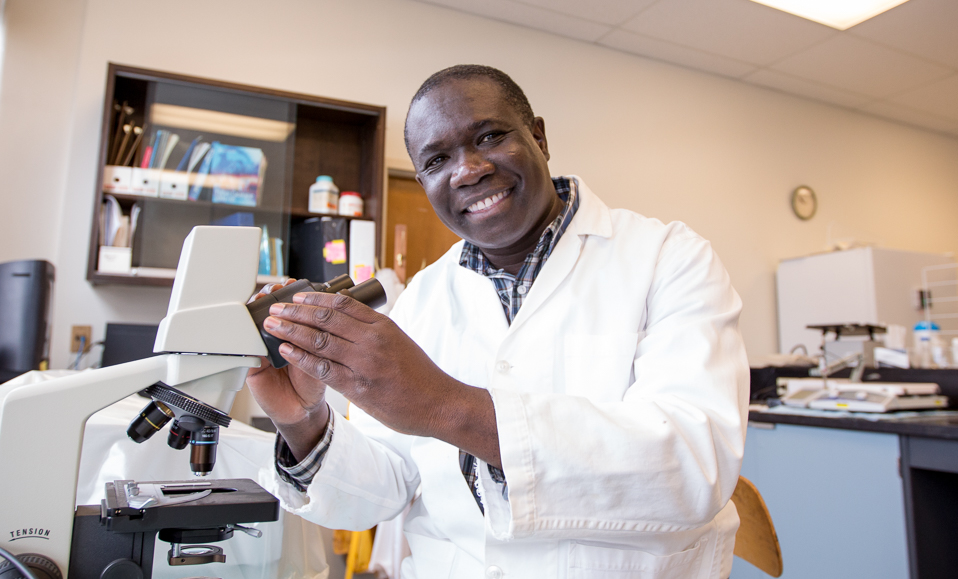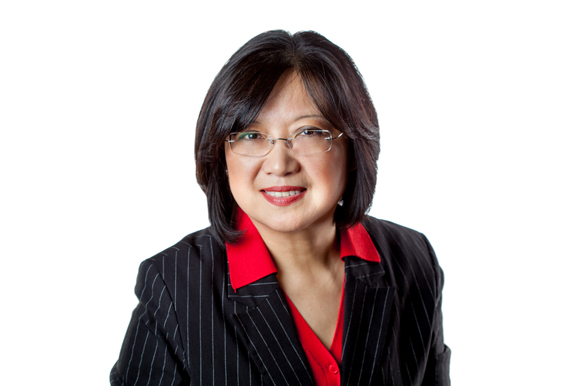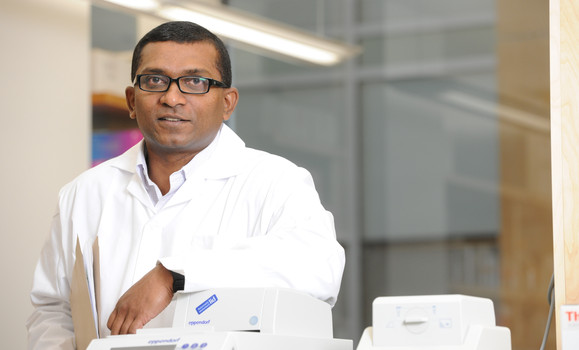Researcher's Corner
Dr. Sean Myles - In his words, Sean Myles is ‚Äúsuper-passionate about food.‚ÄĚ
In his words, Sean Myles is ‚Äúsuper-passionate about food.‚ÄĚ
It’s a passion he has turned into a research mission. Under the banner of his project, Dr. Myles studies the many different traits of apples that we enjoy with the goal of finding out ways to breed new apple varieties and help sustain our future food supply. In his mind, there's no better time to create a collection of as many different kinds of apples as possible with the goal of breeding new varieties that require less chemicals to grow, taste great and will sell out in grocery stores.
The work of his eight-person lab is far from genetic engineering and Dr. Myles is quick to make the distinction.
"We're not in the business of creating GMOs," he says. "We're figuring out how to combine the desirable traits from the thousand-plus apple varieties we currently have into new varieties and, in the end, preserve this precious biodiversity."
Dr. Myles, currently the Canada Research Chair in Agricultural Genetic Diversity and also an assistant professor in the Faculty of Agriculture, works out of the Apple Biodiversity Collection at the Atlantic Food and Horticulture Research Centre in Kentville, N.S., A few years ago, he and a few other researchers planted an orchard that he describes as the ‚ÄúUnited Nations of apples.‚ÄĚ Today, it's home to more than 1,000 apple varieties. Some of these apples we know as Macintosh and Honey Crisp, while others are wild varieties coming from places like Kazakhstan, and may have traits that could be used to make a new hit apple.
The majority of the team's work happens down the road from the orchard on computers, where they evaluate these traits, sequence the genomes and analyze the millions upon millions of letters making up the DNA of these apples. From there, they'll spend the next few years attempting to determine which two apples can be bred together to create a new hit variety.
Eventually, their research will be passed on to Canada's apple breeders, who will be the ones to plant the seeds, evaluate the tree's fruit and decide if they're worthy of being sold in grocery stores. It's a process that can take decades for breeders, but Dr. Myles is hoping that the team's research will shorten the process and that, soon enough, we'll have new apple varieties to enjoy.
When the time comes to test the most important trait ‚ÄĒ taste ‚ÄĒ Dr. Myles will have to call on other people to do it: although he‚Äôs got a passion for food, he's allergic to apples.
Dr. Lord Abbey - Have you ever wondered what you could do with your compost? That there might be alternate uses for what lies inside your green bin?
Compost Tea, Anyone?
Have you ever wondered what you could do with your compost? That there might be alternate uses for what lies inside your green bin?
Dr. Lord Abbey, an assistant professor with the Department of Plant & Animal Science is investigating just that.
‚ÄúAs a teenager who grew up in a city, the source of my food had always been a mystery to me. I wanted to do medicine but I was curious about the work of nature and the wisdom of our farmers. As a result, I decided to pursue agriculture, obtaining a BSc Agriculture in Ghana,‚ÄĚ he explained. Composting and compost use has been on his radar for quite a while now. ‚ÄúIt‚Äôs about time to explore the versatility of compost and its derivatives in other ways for its further promotion and value-addition and to open up new research and business opportunities,‚ÄĚ he explained. This will boost consumer confidence and offers a chance for producers to make a bit more money while safeguarding the environment.
Composting and compost use has been on his radar for quite a while now. ‚ÄúIt‚Äôs about time to explore the versatility of compost and its derivatives in other ways for its further promotion and value-addition and to open up new research and business opportunities,‚ÄĚ he explained. This will boost consumer confidence and offers a chance for producers to make a bit more money while safeguarding the environment.
Compost is used in a variety of fields and specialties including agriculture, horticulture and even for erosion control. Dr. Abbey is researching just how useful compost can be and is trying to find new and better ways to use it in agriculture.
His work includes the impact of drying and ionizing radiation effects on compost and plant response and compost tea formulation for flower and foliage vase-life extension.
Compost tea is exactly what it sounds like- compost is used and sits in water in something like a tea bag to attempt to get all of the nutrients out of it and the ‚Äėtea‚Äô is then used to fertilize plants. This tea will be tested to see if it will lengthen the life span of grazing crops, also known as ‚Äúforages‚ÄĚ.
In addition to this, Dr. Abbey is working on an agro-economic assessment of the long-term application of green bin compost. This involves looking at how putting green bin compost in the soil will affect how productive the plant will grow and impact on soil health over an extended period of time.
‚ÄúThe goal of my research is to develop a sustainable, horticultural production system based on integrated and efficient crop management strategies and a food system approach to crop diversification,‚ÄĚ added Dr. Abbey.
Tea anyone?
Dr. Gefu Wang-Pruski - Working with growers to produce high quality potatoes that are not only environmentally friendly but adaptive to different climates.
Providing a healthier future for potatoes
By: Michelle Thompson
Whether mashed, baked, scalloped or fried… potatoes are often considered a comfort food by many but this humble vegetable has grown to become an integral part of much of the world's food supply and the number one vegetable crop in the world.
Researchers at Dalhousie University’s Faculty of Agriculture continue to work with growers to produce high quality potatoes that are not only environmentally friendly but adaptive to different climates.
 Dr. Gefu Wang-Pruski, a professor of molecular biology in the Department of Plant, Food and Environmental Sciences at the Faculty of Agriculture has been doing field to fork research on potatoes for nearly 20 years. ‚ÄúI try to help growers and consumers by producing potatoes that are environmentally friendly and that also provide a healthy food choice,‚ÄĚ explains Wang-Pruski.
Dr. Gefu Wang-Pruski, a professor of molecular biology in the Department of Plant, Food and Environmental Sciences at the Faculty of Agriculture has been doing field to fork research on potatoes for nearly 20 years. ‚ÄúI try to help growers and consumers by producing potatoes that are environmentally friendly and that also provide a healthy food choice,‚ÄĚ explains Wang-Pruski.
Her research program looks at producing food smartly, not just for high quality consumption but with a positive environmental impact on the soil, air and water needed to grow our food. The end result is that high quality nutritious potatoes can be grown with a minimum input of fertilizer, pesticides and fungicides.
‚ÄúThere is a great need in the Maritime region for supporting this industry to lead to better economic growth, farm gate value and improved industrial performances,‚ÄĚ explained Wang-Pruski.
Wang-Pruski is examining a number of different aspects in her potato research program including investigating and improving the quality of potatoes used for French fries by reducing the darker color that can often appear after cooking. She is identifying the genetic markers of potatoes so they can be better adapted to growth in different climates around the world and is also working to improve potato production by managing the diseases and pests that can affect potatoes, such as late blight, Verticillium wilt, scab and wireworm. One of the major strategies being studied is to reduce the use of fungicides and pesticides that potato growers spray on their potatoes while they are growing.
‚ÄúThe strong support from the potato industry and positive feedback from growers makes my work more exciting and rewarding, which in turn influences everyone in my lab to become more committed to do excellent work,‚ÄĚ explained Wang-Pruski.
Dr. Wang-Pruski is also leading a consumer research initiative that examines potato consumption patterns and consumer needs while developing marketing strategies for the industry.
Packed full of vitamins, minerals and nutrients, environmentally friendly and adaptive to different climates, the humble potato may not be so humble after all!
Dr. Vasantha Rupasinghe - Apple bioactives could help fighting against breast cancer
 The most recent research conducted by Dr. Vasantha Rupasinghe‚Äôs research team at the Dalhousie University has shown that a flavonoid preparation isolated from apple peels called apple flavonoid fraction 4 (AF4) has the potential to keep the breast cancer cells under control. According to a research presentation made by Dr. Rupasinghe at the Functional and Medical Foods for Chronic Disease Conference at the Harvard Medical School, Boston, USA, the apple flavonoids can kill selectively triple negative breast cancer cells, a group of breast cancer cells that are difficulty to treat with chemotherapy. Dr. Rupasinghe explains ‚ÄúApple flavonoids induced cytotoxicity in a dose- and time-dependent manner but selectively in cultured mammary carcinoma cells‚ÄĚ. We have also seen that apple flavonoids could suppress the growth of tumors created in experimental animals‚ÄĚ. Researchers are now in progress to explain how the apple flavonoids act at molecular level by investigating their interactions with various cellular mechanisms in cancer and normal cells. Recently, Dr. Rupasinghe‚Äôs team has also made a scientific publication to demonstrate that apple flavonoids can kill liver cancer cells with minimum adverse effect to healthy normal liver cells at the same concentration. These research have been conducted by his graduate students, Wasu Fernando, a PhD student in pathology, and Sudhanshu Sudan, a Masters student who graduated recently.
The most recent research conducted by Dr. Vasantha Rupasinghe‚Äôs research team at the Dalhousie University has shown that a flavonoid preparation isolated from apple peels called apple flavonoid fraction 4 (AF4) has the potential to keep the breast cancer cells under control. According to a research presentation made by Dr. Rupasinghe at the Functional and Medical Foods for Chronic Disease Conference at the Harvard Medical School, Boston, USA, the apple flavonoids can kill selectively triple negative breast cancer cells, a group of breast cancer cells that are difficulty to treat with chemotherapy. Dr. Rupasinghe explains ‚ÄúApple flavonoids induced cytotoxicity in a dose- and time-dependent manner but selectively in cultured mammary carcinoma cells‚ÄĚ. We have also seen that apple flavonoids could suppress the growth of tumors created in experimental animals‚ÄĚ. Researchers are now in progress to explain how the apple flavonoids act at molecular level by investigating their interactions with various cellular mechanisms in cancer and normal cells. Recently, Dr. Rupasinghe‚Äôs team has also made a scientific publication to demonstrate that apple flavonoids can kill liver cancer cells with minimum adverse effect to healthy normal liver cells at the same concentration. These research have been conducted by his graduate students, Wasu Fernando, a PhD student in pathology, and Sudhanshu Sudan, a Masters student who graduated recently.
The last decade of research conducted by Dr. Rupasinghe and his collaborators at Dalhousie University have also shown multiple health benefits of apple flavonoids including, reducing the risk for cardiovascular disorders and neurodegenerative disorders such as multiple sclerosis. His research has also helped local industry to develop flavonoids-preserved value-added fruit products. Currently, as a Professor and Killam Chair in Functional Foods and Nutraceuticals, he is working on developing food and natural health products to fight against cancer and other metabolic disorders. He believes that finding ways of prevention of these chronic disorders using dietary interventions established from local fruits and vegetable along with a healthy life style is the most realistic. Dr. Rupasinghe’s research program, which has attracted $6.7M (since 2004) in external funding, has resulted in three patent filings, one license agreement and contributions to the commercialization of over a dozen value-added food products. He has published over 130 peer-reviewed research articles (Scopus author h-index 30 and total citations 2456) and trained over 100 highly qualified personnel (HQP). He serves as the chair of the Scientific Expert Council of the Canadian Institute of Food Science and Technology (CIFST).
